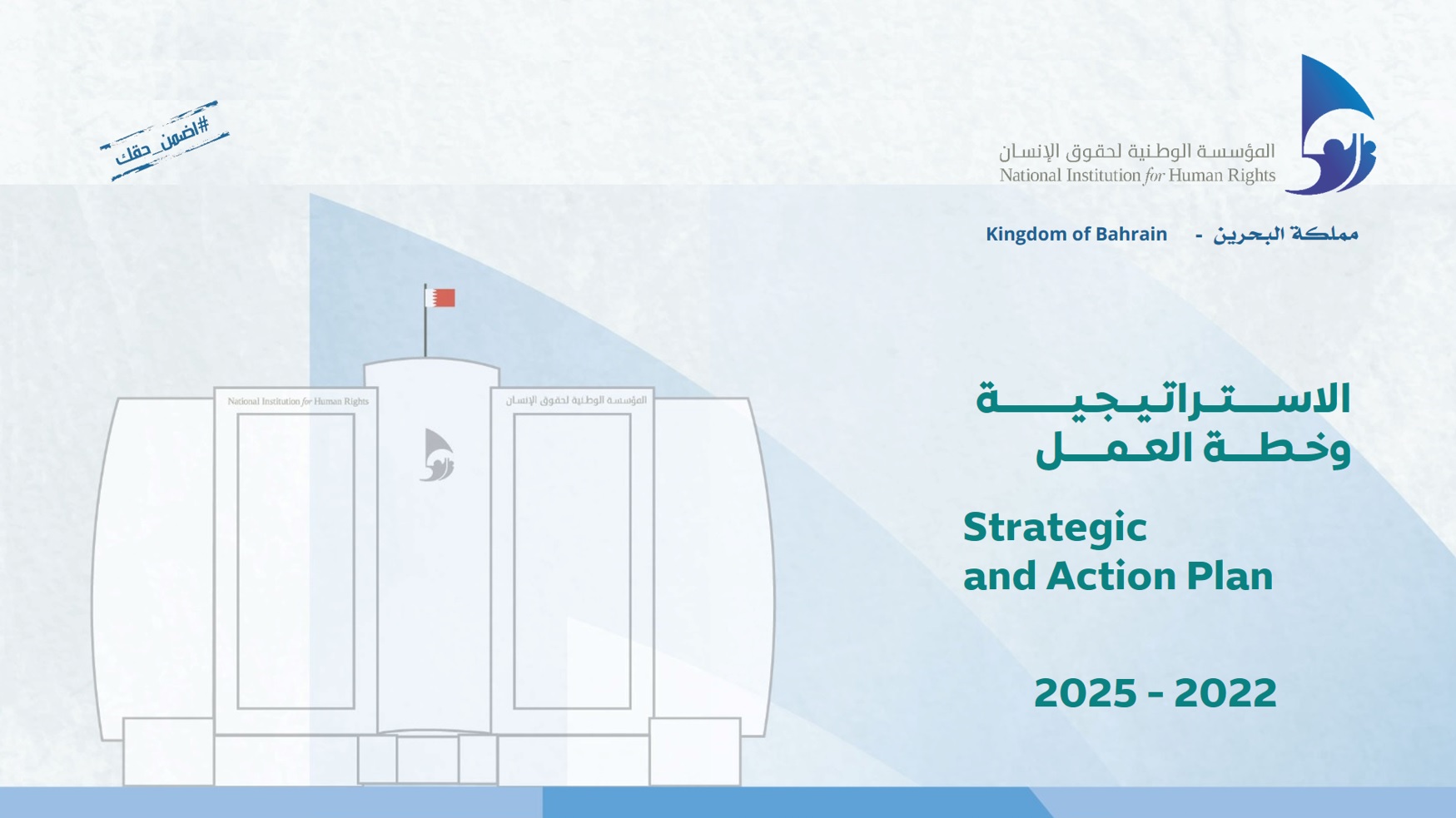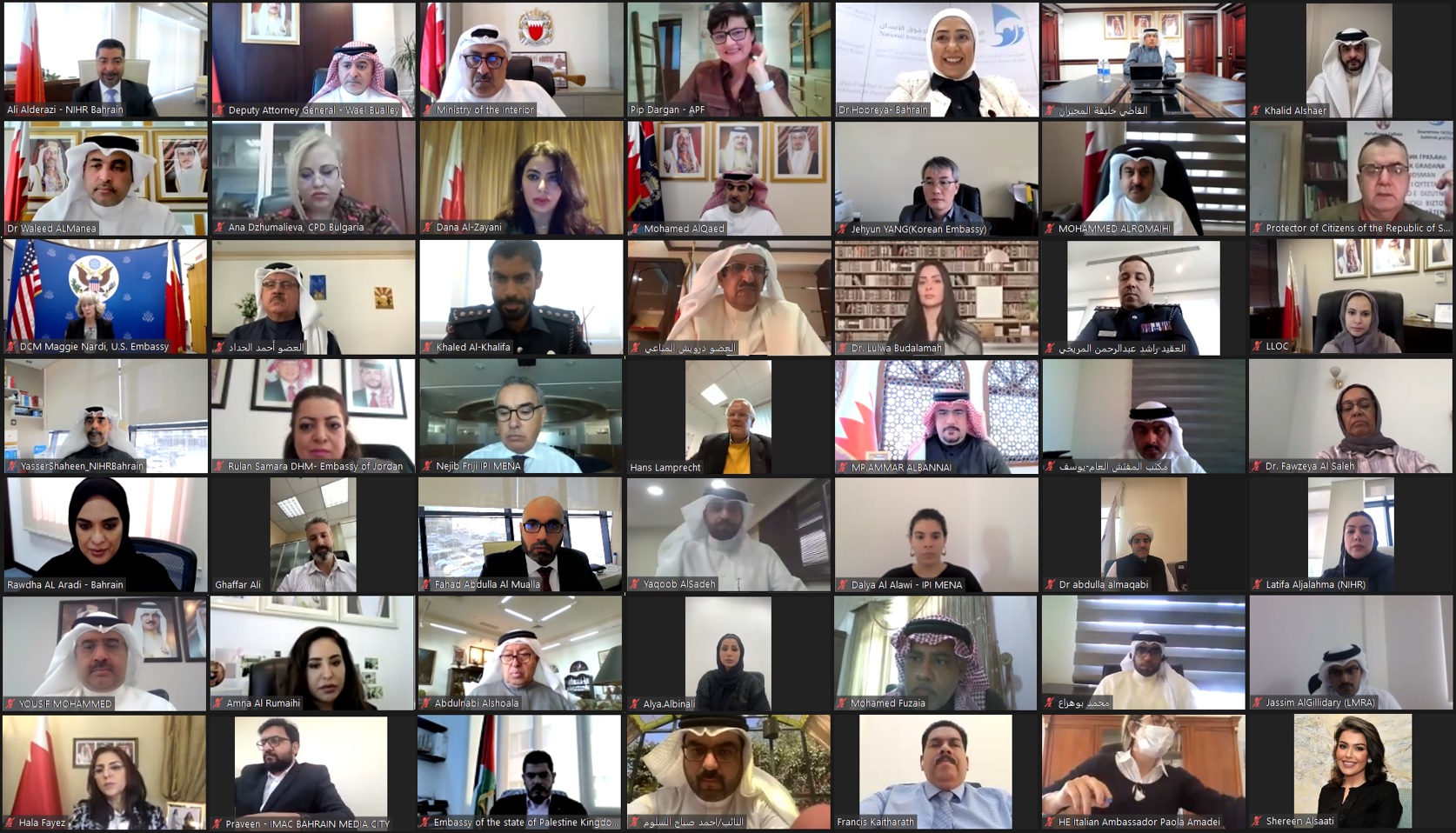NIHR is launching its Strategy and Action Plan 2022-2025

Eng. Ali Ahmed Al-Derazi, Chairperson of the National institution for Human Rights (NIHR), launched the NIHR Strategy and Action Plan 2022-2025 via videoconference with a wide participation of members to the House of Representatives and Shura Council, senior officers in official authorities, Arab and foreign ambassadors accredited to Bahrain, representatives of civil society organizations, the Arab Network of National Human Rights Institutions, the Asia Pacific Forum, human rights defenders, and local and international media.

At the beginning of his opening speech, Al-Derazi extended his sincere thanks and appreciation to His Majesty King Hamad bin Isa Al Khalifa, the King of the State, for his voluntary initiative to establish the National Institution for Human Rights (NIHR), believing in the national need to deal responsibly with the human rights file and issues in the Kingdom of Bahrain, appreciating at the same time the efforts and support of His Royal Highness Prince Salman bin Hamad Al Khalifa, Crown Prince and Prime Minister, for everything that would promote and protect human rights in the Kingdom of Bahrain, given the basic and pivotal role played by the NIHR in the area of human rights at local and global levels.
During his speech, Al-Derazi pointed out that the NIHR was able, during the time frame of its previous strategy and action plan, to successfully achieve (92%) of its objectives, in a manner that meets the standards of performance indicators that have been set in this regard, despite the exceptional circumstances that have occurred in the world as a result of Covid-19. Over the past three years, the NIHR successfully attracted (8,200) people to participate in its activities aimed at spreading a culture of human rights, and participated in (156) local
and foreign events. The NIHR successfully provided (47) advisory opinions to the constitutional authorities in the Kingdom of Bahrain, and three parallel reports to the treaty bodies, and successfully dealt with (29) questionnaires received from academic bodies and institutes, as well as governmental and non-governmental, regional and international organizations.
Al-Derazi also explained that, during the last period, the number of complaints related to human rights of all kinds received by the NIHR and legal aids provided by it amounted to about (6000) complaints and legal aids, in addition to (75) field visits conducted by members of the NIHR Council of Commissioners to correction, rehabilitation and pretrial centres, places of detention, health care institutions, social homes, housing for expatriate workers, and quarantine and health isolation centres to ensure the provision of a sound and healthy environment. In addition, NIHE representatives attended (66) trial sessions, for the purpose of observing their course and ensuring that fair trial guarantees were provided to all parties to the litigation.
At the conclusion of his speech, Al-Derazi stated that the NIHR was keen to ensure that its Strategy and Action Plan 2022-2025 is in line with the Kingdom of Bahrain's National Plan for Human Rights, in order to continue the NIHR’s effective role in the protection, promotion and development of human rights in the Kingdom of Bahrain.
At the end of his speech, Al-Derazi expressed his sincere thanks and appreciation to all NIHR partners for their permanent and constructive cooperation with the NIHR in order to achieve its goals and mission, stating the NIHR’s aspiration to unify the efforts made to achieve more cooperation to enable everyone to exercise and enjoy their rights without any discrimination.
On the other hand, Dr. Hooreya Hassan, member to the NIHR Council of Commissioners, presented an overview of the strategic objectives contained in the NIHR Strategy and Action Plan 2022-2025, where she stated that the NIHR was keen that its Strategy and Action Plan is fully consistent with the efforts of the Kingdom of Bahrain to strengthen cooperation with regional and international organizations in the area of human rights, and took into account Bahrain’s recent approval of a Memorandum of Understanding between the Government of the Kingdom of Bahrain and the United Nations High Commissioner for Human Rights (UNHCHR), which aims to enhance cooperative work between the two sides in the areas of technical assistance, capacity-building and programmes for the promotion of a culture of human rights, which will have a significant impact on achieving all the goals attempted by the Strategy.
Dr. Hooreya Hassan explained that the NIHR Strategy 2022-2025 will focus on four main objectives as follows:
Objective 1: The Impact of Covid-19 on National Economy and Entrepreneurship. Through this objective, the NIHR will work to on the compatibility of national economy with economic, social and cultural rights. It will enhance awareness of the importance of
entrepreneurship sector and its consistency with human rights principles, follow-up on the effects of Covid-19 on individuals’ exercise of their right to work, and ensure that companies and commercial establishments respect the rights of their employees.
Objective 2: Education and Dissemination of a Culture of Human Rights. This objective will focus on spreading awareness of human rights principles through students in public and private schools, institutes and academic institutions, and attempt to integrate human rights principles and concepts into the educational curricula of public and private institutions.
Objective 3: Achieving Equal Treatment and Gender Equality. This objective will highlight the link between women’s rights and all economic, social and cultural rights, cooperation with civil society institutions and encouragement of public and private sectors’ application of best practices related to the promotion and protection of women’s rights.
Objective 4: Enjoyment of the Highest Attainable Standard of Health by Everyone. This objective will enhance everyone’s enjoyment of the highest attainable level of physical, psychological and social health and monitor and follow-up the conditions of individuals within health institutions, including institutions located within correction and rehabilitation centres, to ensure that everyone exercises their health rights, and will study the impact of pandemics related to public health on individuals’ enjoyment of the highest level of health.
At the end of her speech, Dr. Hooreya Hassan thanked all partners, stating the NIHR’s constant aspiration to continue to activate more cooperation and partnership with everyone, in order to build an integrated system for the application of human rights principles.


